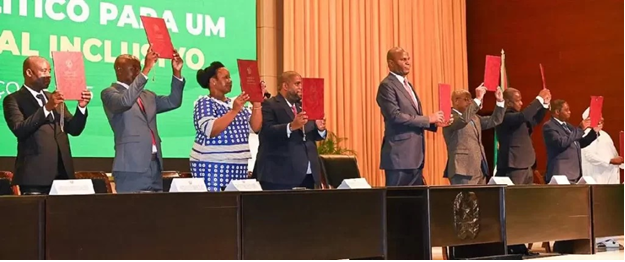Selective Pardon of Post-Electoral Detainees Contravenes Constitutional Principles and Human Rights
Categories

Selective Pardon of Post-Electoral Detainees Contravenes Constitutional Principles and Human Rights
During the post-electoral protests that marked 2024 and early 2025 in Mozambique, approximately 7,200 citizens were detained, according to updated data from Plataforma DECIDE and the Mozambican Bar Association. Of these, about 4,300 have been released, but around 3,000 remain detained in penitentiary facilities across the country, many without clear evidence, without being caught in the act, and under strong indications of arbitrary detention.
On March 5, 2025, nine political parties and the Government signed the Political Commitment for Inclusive National Dialogue, which was later approved by the Assembly of the Republic (April 2) and promulgated by the President of the Republic on April 11. Clause Six of this commitment provides for the granting of pardons to citizens convicted in the context of the protests.
However, paragraph 2 of Clause Six specifies that the pardon will apply only to “certain citizens,” a position reiterated by President Daniel Chapo on June 20, 2025, when he stated that a request for a “general amnesty has no legal basis.”
IMPLICATIONS FOR THE PRINCIPLE OF EQUALITY AND JUSTICE
Plataforma DECIDE understands that the partial pardon requires careful review, as it may seriously violate Article 35 of the Constitution of the Republic, which enshrines the Principle of Equality, guaranteeing that all citizens are equal before the law without any kind of discrimination. Pardoning only “some” implies unequal treatment among people who were detained under the same circumstances, undermining the foundations of the rule of law.
We highlight that a considerable number of detainees:
• Were arrested without being caught in the act;
• Had no immediate access to legal assistance;
• Faced opaque legal processes in contexts of repression and intimidation.
Additionally, arbitrary detentions related to the protests still occur, especially in the provinces of Maputo and Nampula, further limiting the effectiveness of the partial pardon, which only covers the period up to the signing of the political commitment.
CIVIL SOCIETY MUST BE PART OF THE SOLUTIONS
The absence of civil society in the agreements and processes aimed at promoting national reconciliation and democratic reform compromises the legitimacy and depth of the solutions adopted. It is imperative that reconciliation mechanisms be inclusive, representing not only political interests but also the rights of ordinary citizens.
Recommendations:
• Urgent review of the pardon clause, replacing the current selective model with a universal and transparent pardon, with objective criteria excluding only proven serious cases (homicides and use of firearms);
• Creation of a Review Commission with effective participation of civil society to ensure genuine justice and reconciliation;
• Immediate review of cases of illegal detention, with promotion of adequate reparations to affected citizens, many of whom suffered severe impacts including loss of employment and exposure to vulnerable situations;
• Scheduling the effective date for the implementation of the pardons.
We believe that true reconciliation can only be built on justice, transparency, and inclusion. Measures that respect the dignity of all citizens strengthen the construction of lasting peace in Mozambique.
Plataforma DECIDE
Other images

